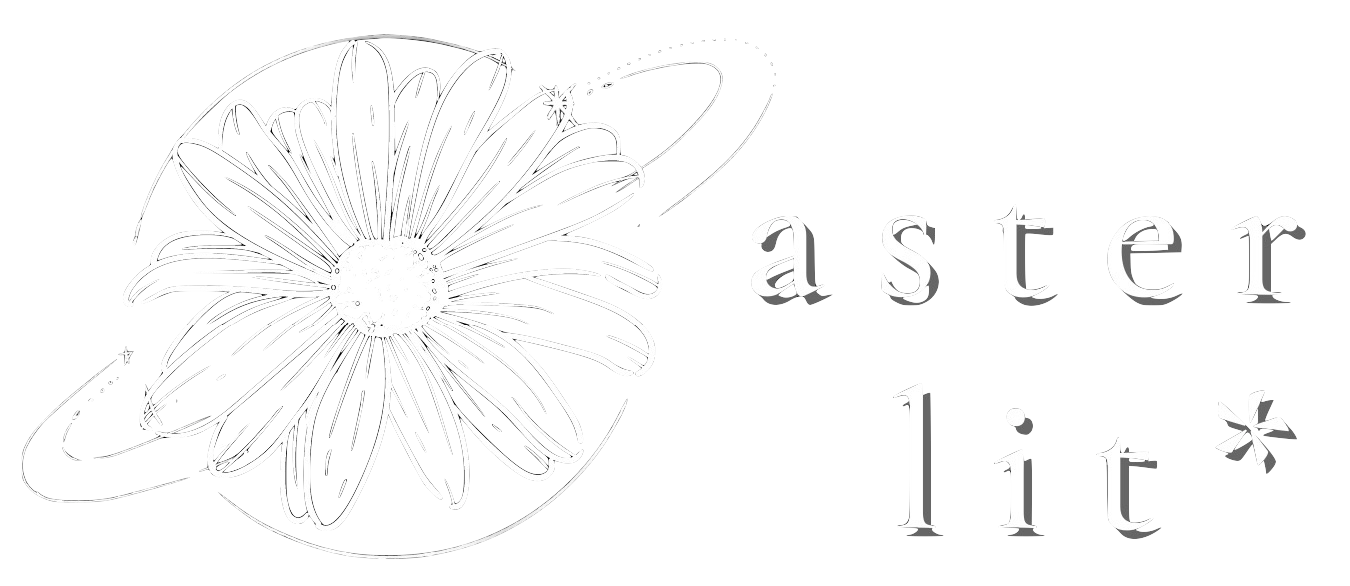
Aster Lit: Meridian
Issue 14—Fall 2025
AN UNCOMFORTABLY LONG LIST OF CONFUSING MOMENTS IN YOUR LIFE THAT YOU WISH TO LEAVE UNEXPLAINED
Erin Han, United States
The more I see, the less I know for sure. – John Lennon
I am not young enough to know everything. – J.M. Barrie
I.
You sit small and stiff in the bright-lime plastic chair in the office, worn in with the smell of
sweat, animal crackers, and fear of those who came before you. The carpeted floor is a sickly
sort of green, and even at the ripe age of four, you know that the only live things in that room are
your twinkling eyes and your mom’s deeply worried ones, with pupils practically trembling.
Each question is meant to validate, or invalidate, the “hyphen American” half of your
four-year-old title. With each question, a thesis-long answer twirls and backflips in your mind,
but you keep silent in the face of the messy-bunned lady who questions you. Not because you
don’t know, of course, but because you are shy, because you didn’t think that anyone would ever
bother to test you on something so rudimentary. You smile as your face turns slightly pink —
you’re trying to be cute, like your band of quiet friends do at preschool. Only in ten years would
you learn what the ESL test really was for, and that the messy-bunned lady was the first person
in your life not to find you endearing at all, not in the slightest. Your mom tells you this during a
middle school summer, as you both try, desperately, to kill time on a night thick with jet lag. You
cry silently for that clueless child, then grimace at the teenager who is overreacting.
II.
You collect cicada shells in your grandparents’ backyard — pluck them off of perilla leaves, oak
tree bark, the stems of cosmos. You hate cicadas usually, flies and mosquitos too, but these shells
attract you. You bring out a blue plastic colander, scuffed all around, and start collecting until the
bowl begins to overfill. It really is a disturbing sight: an upturned graveyard rife with outgrown
shrivels of clothing that the insects once thought were permanent skins. Husks empty of living
meat that once buzzed, screamed even. And so you realize then that any version of a body
without a soul, though sometimes more digestible, is less scary only as much as it is less itself.
III.
You stash scrambled piles of dollar bills and pink, Korean banknotes into the tin box that you
keep beneath your bed, clammy fistfuls at a time. From the kitchen, Mom screams out the adage
that she has preached ever since your collecting habits began — “Money needs to circulate in
order to stay money” — but you keep stuffing. As you do this, you accidentally grab at the green
bills you have carefully paper-clipped and taped to the back of the tin box: gifts from the
grandmother from church who’s given you packs of Tropical Twist Trident gum for over 300
consecutive Sundays. Her funeral is tomorrow. As you grab the pile, the paper-clipped booklet
rips. In half, straight down the middle. And with it, so does a fresh piece of your heart’s flesh
tear. Mom continues to pellet you with an uneven stream of jagged words. Now you’ve done it
— you’ve stripped your most valuable bills of their mobility, so that now they’re no longer
money. You smile, as wryly as a six-year-old possibly can.
IV.
Your family’s stay in Seoul is elongated by two months because of a complication you do not
know about. You do not notice the whispered fights that your parents have behind closed doors,
you do not know what the papers that your aunt shoves in her husband’s face are for, and the
curses that your eldest cousin whispers under his breath are too foreign for you to understand.
This mishmash of background actors and the muddled soundtrack of this summer only unblurs
and unmutes in your memories when you are well into your teens. This summer, you are the
main character in your self-directed film that features the ultimate all-star cameo: your
grandmother. Your parents are occupied with what you assume is busywork, so you are free to
roam. You frequent visits with your grandmother to her favorite grocery (which is overstocked,
always), you pick tomatoes with your grandmother on her balcony, you peel flaky garlic with
your grandmother on her green rooftop, and you bake under the sun with your grandmother in
her garden as you search for snails; most often found stuck to the shady underbellies of her
beloved lettuce heads, they are your summer companions, pets that you will feed cucumbers,
carrots, excess love, and whispers.
Because of the long stay’s unfortunate byproduct of attachment, tears stream down your cheeks
at the airport, leaving ashy streaks as they inch across your skin. Your eyes are pink and puffy,
distraught, almost pretty. But they are open enough for you to glimpse your grandmother waving
goodbye before she disappears from your line of sight — at the last split second that you see her,
she is smiling, joyous, her posture sprung up like you’ve never seen before, as if an ineffable
weight has been lifted off her shoulders. You bring your fingers to your eyes and try to shove the
salty tears back into the sockets.
V.
Your second favorite cousin tells you that you used to be a nuisance in her life up until this year
— an excessively talkative kid who came over each year to slice away a piece of her summer.
“Thank God you’re not like that anymore, finally,” she says. You swallow back a hard lump of
silence, and then you groan inside, knowing it won’t digest for a couple of months, at least. As
you tune out the rest of her words, the fragile mind barricaded only by your forehead (which has
been painted, by this cousin, in a layer of foundation three shades too light for your skin) flashes
with scenes from past summers — back when she was your personal celebrity, the trendsetter
you would observe in awe and shamelessly attempt to mimic (whether it was the jokes she told,
the cheap nail polish she wore, or even the coy smile she flashed), back when a day in Seoul
wouldn’t truly begin for you until your cousin finished school and came to visit you. She sips
some more of her iced something. You sip away at your peach iced tea and, with it, these
memories of back when she was the centerpiece of your summers, so that they no longer swirl
around in your clear cup for everyone else to see.
VI.
Your head tipped back as if you’re drinking in the rays, you stare up heavenward at the sun. You
feel the sheer light start to cloud your vision, like the polar opposite of what happens when you
stuff your face into your knees and start to see auroras. It hurts, it stings, it numbs, but you keep
your head angled just like that for a second longer. You regret it immediately and jerk your head
away. You laugh, though, at your audacity, or lack thereof. You do this knowing full well that
you will consequently see white specks in your vision for at least a week, because you’re
thinking, ‘Maybe it’s worth a little suffering if you get to catch even a glimpse of something
otherworldly in return.’ One thing you’ve always known is how to put on a show for yourself, a
one-membered audience, to teach yourself something with what looks like tomfoolery to anyone
else, to glean lessons from the pages within the flimsy folder of such aggressively strange
memories that you store away in your head — though, of course, you’ll take them out for review
only after a minimum of ten years have passed since they were stuffed in there. But for now, you
wish to keep this folder closed and out of your view, out of your mind (when it’s possible),
besides for the occasional look-see. All you can manage to do right now is list them, the
moments, the memories.
Continue to do that now if you cannot help it; list them five hundred times over if you’d like, but
nothing more.
Erin Han is a Korean-American writer from Cambridge, Massachusetts. She is a student at Phillips Exeter Academy and a co-founder of Nova Literary Magazine. She enjoys reading with a London Fog in hand, listening to music, and the look of Times New Roman font.
